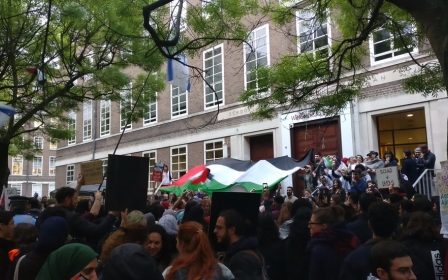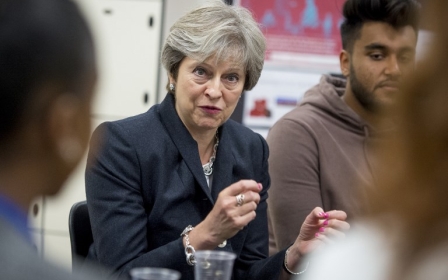SOAS 'questioned over lack of student Prevent referrals', director says

London's School of Oriental and African Studies is being "frequently" questioned about why it has not referred any of its students into a counter-extremism programme for people deemed to be at risk of being drawn into terrorism, the university's director told parliament's human rights committee on Wednesday.
Valerie Amos also said the government's contentious Prevent counter-terrorism strategy had resulted in SOAS facing greater scrutiny because of the university's high numbers of students from international and ethnic minority backgrounds.
“There is certainly a sense at SOAS that as a university and given the nature of the makeup of our student body that they are under greater scrutiny as a result of the Prevent legislation,” Amos told the committee as part of an inquiry into free speech on university campuses.
Targeting individuals
Student officials told the committee that Muslim students had complained of being questioned by Prevent officers about how often they prayed, and said that some students from minority backgrounds were afraid to express their political views because of the legislation.
Amos, a member of the House of Lords and a former Labour government minister and senior United Nations humanitarian official, said SOAS faced questions over why it had not reported any of its students to Channel, a Prevent-backed counter-extremism programme targeting individuals considered to be “vulnerable to being drawn into terrorism”.
SOAS was “frequently being asked as a university authority why we have not made any referrals through what is called Channel with respect to the Prevent legislation, so indicating to the authorities that there are individuals that we are concerned about”, Amos said.
“Our view is that we feel as a university we have a duty of care to all of our students, but the policies that we have outside of Prevent are sufficient in helping us to recognise whether or not there are students that we should be concerned about.
“We have not felt that we have had to refer any students through the Channel mechanism. That does not stop us being asked why we have not done that, which I think is interesting.”
However, a spokesperson for SOAS told Middle East Eye that Amos had not intended to imply that any formal concerns had been raised by the Higher Education Funding Council for England (HEFCE), which oversees the implementation of Prevent within universities, or by Prevent officers or the police.
The spokesperson said that Amos had been alluding to repeated freedom of information requests asking SOAS how many referrals had been made.
Since 2015, staff working for universities and other public bodies have been required to implement the Prevent Duty, which obliges them to “have due regard to the need to prevent people from being drawn into terrorism”.
Critics of Prevent say it discriminates against Muslims, who account for a disproportionate number of referrals, and has had a “chilling effect” on free speech on university campuses and in schools.
Frida Gustafsson, president of the student union at the University of Sussex, told the committee that Prevent had “significantly impeded and affected students individually”.
“I know of at least two cases at Sussex where Muslim students... were approached by Prevent officers and asked questions basically to figure out if they were leaning towards extremism,” Gustafsson said.
“This has really led to quite a few students coming to me to say that they are afraid of speaking their mind. They are actually even afraid of going into the campus prayer room because they have been asked in interviews how many times a day they pray.”
Free speech threatened?
Patrick Kilduff, president of the Edinburgh University Students’ Association, said that Prevent was of particular concern to students from minority, Jewish or Muslim backgrounds, who felt inhibited from expressing their political views.
“If we believe that free speech is so people can hold truth to power, and especially marginalised groups, then this is stopping marginalised groups... from being able to voice their concerns or host events and I think that is what is chilling,” said Kilduff.
Kilduff added that concerns about Prevent had led to the cancellation of a campus discussion with a Syrian refugee.
“A society was wishing to host a question and answer session with a Syrian refugee in order to enlighten and enhance students' understanding of the refugee crisis in Syria,” he said.
“They secured the funding to do it, they secured the room for it, they'd secured everything but they chose simply to cancel it by virtue of the fact that they were so concerned that this could seriously damage their future and their existence in the United Kingdom."
Middle East Eye last year reported on how universities were being advised to “manage” events on campus relating to “contentious” issues, including Palestine and criticism of Western foreign policy in the Middle East.
The advice led to some universities cancelling events organised by student Palestinian societies and imposing “independent chairs” as a condition for some events to go ahead.
In introductory remarks to Wednesday's session, Harriet Harman, chair of the human rights committee, said that free speech requirements imposed on universities appeared to have resulted in a “whole panopoly of processes” and “pages and pages of bureaucracy and inhibitions”.
“It looks to me like these free speech codes of practice are like a machinery of restricting free speech rather than promoting it,” said Harman.
But other university leaders suggested that concerns about limits on free speech on campus were overstated.
Timothy O'Shea, vice chancellor of the University of Edinburgh, said he did not feel that Prevent legislation had been “particularly onerous”, and said there had been no reduction in the number of speaker-led events as a consequence.
Adam Tickell, vice chancellor of the University of Sussex, said the evidence base suggesting that free speech on campuses was being inhibited was “anaemically small”.
“I can't see any systematic evidence that free speech is being inhibited,” he said.
But Amos said that Prevent had contributed to a “squeezing” of SOAS's ability to be “open, diverse and inclusive”.
“There are a whole range of things, how we treat refugees, our visa policy, how Prevent is implemented. All of these things are having an impact on how young people of colour, Muslims, actually feel in terms of being under additional scrutiny," she said.
SOAS is considered a world-leading institution for the study of Middle Eastern affairs, and is home to research centres for both Palestinian and Israeli studies.
It is also well known for the activism of both its students and lecturers. SOAS's student union has been a long-term supporter of the Boycott, Divestment and Sanctions (BDS) campaign and has called for the university to boycott Israeli universities.
Amos said on Wednesday that support for BDS was not the position of the SOAS administration.
SOAS's Prevent page on its website includes a link to the government's Channel referral guidance, but advises that concerns about students or staff members at risk of being drawn into extremism or terrorism should be reported to the university's advice and wellbeing service.
Advocates of Prevent say that Channel is a voluntary process, but an advisory note published by the Department for Education last year suggested that university staff should report students to the police before seeking their consent.
“At the very early stages in a Channel referral, there is likely to be only limited information available in relation to the individual of concern. This often renders such an approach impractical and is potentially liable to undermine, frustrate or prejudice any alternative police action which may be required," the note said.
"So, at this early stage, the university can legally share information with the police regarding an individual of concern, without first seeking their consent.”
New MEE newsletter: Jerusalem Dispatch
Sign up to get the latest insights and analysis on Israel-Palestine, alongside Turkey Unpacked and other MEE newsletters
Middle East Eye delivers independent and unrivalled coverage and analysis of the Middle East, North Africa and beyond. To learn more about republishing this content and the associated fees, please fill out this form. More about MEE can be found here.




